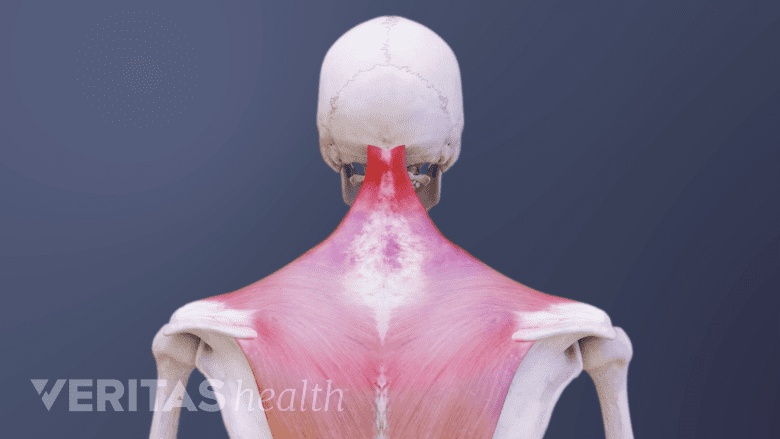Acupuncture has been used in China for thousands of years. It involves the placement of thin needles in the skin at specific points on the body, depending on what is being treated. According to Traditional Chinese Medicine theory, acupuncture helps treat various conditions by unblocking energy (qi) so it can resume flowing naturally through its normal pathways (meridians). Although, scientific studies have not yet confirmed the existence of qi or meridians.
Additionally, some studies have found that acupuncture can stimulate biochemical changes both locally (where the needles are placed) and in the central nervous system. In theory, these biochemical changes may help foster pain relief and other beneficial effects in some cases.1Zhuang Y, Xing J, Li J, Zeng BY, Liang F. History of Acupuncture Research. Neurobiology of Acupuncture. 2013; 1–23. doi:10.1016/b978-0-12-411545-3.00001-8
Chronic neck pain and stiffness are common reasons for acupuncture treatments to be sought.
In This Article:
How Acupuncture Is Applied for Neck Pain and Stiffness

Acupuncture involves inserting thin needles into specific points on the skin to balance the body's energy flow.
Acupuncture treatments can vary widely based on the practitioner’s methods and treatment strategy. In most cases, the acupuncturist starts by asking about the patient’s symptoms, diet, and daily routine, which may give clues about the most effective points on the body to place the needles.
Even when symptoms of pain and stiffness are only in the neck area, the needles may be placed in other areas of the body in addition to the neck. Depending on treatment method, the patient might be asked to lie on the stomach, back, or sit in a reclined position.
It is common for an acupuncture treatment session to last somewhere between 15 and 30 minutes. Relaxing music might be played to help keep the environment calm and soothing. After the treatment is completed, the thin needles are removed and disposed.
The recommended duration and frequency of acupuncture sessions may depend on how long the neck pain and stiffness have already lasted, as well as the severity of symptoms. Ultimately, the decision is up to the patient as to whether the perceived benefits of the acupuncture treatments are worth continuing. Some health insurance plans cover acupuncture for treating chronic pain, but others do not.
Efficacy of Acupuncture to Treat Stiff Neck
The medical literature has been mixed regarding whether acupuncture is an effective treatment for chronic neck pain and stiffness. Some small studies have suggested that acupuncture can help improve neck function and reduce pain, but these results do not appear to last long-term.2Furlan AD, Yazdi F, Tsertsvadze A et al. Complementary and alternative therapies for back pain II. Evid Rep Technol Assess (Full Rep). 2010 Oct; (194):1-764. There is also evidence that acupuncture can help reduce stress levels, which might play a role in reducing neck pain in some individuals.3Sparrow K, Golianu B. Does acupuncture reduce stress over time? A clinical heart rate variability study in hypertensive patients. Med Acupunct. 2014; 26(5):286-294.
See Stiff Neck Causes, Symptoms, and Treatment
Overall, most of the evidence in favor of acupuncture being an effective treatment for a chronic stiff neck is based on people self-reporting or small studies that offer weak scientific evidence. More research is needed to determine whether or not acupuncture can provide more than just temporary relief for a chronic stiff neck.
Risks of Acupuncture

Minor bruising or bleeding may occur after acupuncture.
When performed by a licensed acupuncturist, acupuncture is a relatively safe treatment. Most people report that the treatment feels relaxing, but it is possible for some people to experience minor bruising or bleeding after a needle is removed.4Witt CM, Pach D, Brinkhaus B et al. Safety of acupuncture: results of a prospective observational study with 229,230 patients and introduction of a medical information and consent form. ForschKomplementmed. 2009; 16(2):91-7. doi: 10.1159/000209315. While extremely rare, some serious complications from acupuncture have been reported, such as organ puncture or infection.5Zhang J, Shang H, Gao X, Ernst E. Acupuncture-related adverse events: a systemic review of the Chinese literature. Bull World Health Organ. 2010; 88(12):915-921C. doi: 10.2471/BLT.10.076737
- 1 Zhuang Y, Xing J, Li J, Zeng BY, Liang F. History of Acupuncture Research. Neurobiology of Acupuncture. 2013; 1–23. doi:10.1016/b978-0-12-411545-3.00001-8
- 2 Furlan AD, Yazdi F, Tsertsvadze A et al. Complementary and alternative therapies for back pain II. Evid Rep Technol Assess (Full Rep). 2010 Oct; (194):1-764.
- 3 Sparrow K, Golianu B. Does acupuncture reduce stress over time? A clinical heart rate variability study in hypertensive patients. Med Acupunct. 2014; 26(5):286-294.
- 4 Witt CM, Pach D, Brinkhaus B et al. Safety of acupuncture: results of a prospective observational study with 229,230 patients and introduction of a medical information and consent form. ForschKomplementmed. 2009; 16(2):91-7. doi: 10.1159/000209315.
- 5 Zhang J, Shang H, Gao X, Ernst E. Acupuncture-related adverse events: a systemic review of the Chinese literature. Bull World Health Organ. 2010; 88(12):915-921C. doi: 10.2471/BLT.10.076737


